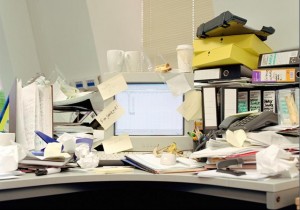The Gemini Janitorial Services team can do a better job making your office shine if it is free of clutter. We thought this article on a messy desk was interesting.
After all, you want your desk to be as clean and organized as the work space around you.
The Dangers Of A Messy Desk
Jenna Goudreau, Forbes Staff
Is your monitor framed with layers of post-it reminders? Is your desktop hidden under stacks of papers, or your guest chair buried under a pile of outerwear? Your colleagues are judging you.
According to a new survey of over 1000 workers by staffing firm Adecco, a majority of Americans (57%) admit they judge coworkers by how clean or dirty they keep their workspaces. Meanwhile, nearly half say they have been “appalled” by how messy a colleagues’ office is and most chalk it up to pure laziness.
“With so many open office plans today, more people can see into your workspace, and they do judge,” saysJennie Dede, vice president of recruiting for Adecco. “It’s often personal. They think that you must be a slob in your real life.”
This comes after a report last year by OfficeMax that found that office clutter undermines productivity and motivation. “Your performance coincides with your workspace,” says Dede. “When it’s organized and precise you have the mindset and motivation to work.”
If you’ve let your clutter get out of hand, it might be time for some spring cleaning. Whether you’re in a cube or a c-suite, organization experts offer timeless tips to streamline the mess and keep your office tidy year-round.
Set A Weekly Appointment To Clean
Coworkers will associate a messy office with your organization skills and assume their project or proposal will get lost in the landfill that is your desk, says Dede. It’s important to stay on top of clutter consistently, so that it doesn’t accumulate over time and become too intimidating to tackle. She recommends setting a reoccurring reminder on your calendar to tidy up your workspace for 15 minutes once a week. Toss any trash or items you no longer need, gather personal items that need to be taken home, and sort loose paperwork.
Don’t Make Piles, Set Limits
Don’t fool yourself. Making piles does not reduce clutter. Organization guru Peter Walsh, author ofLighten Up: Love What You Have, Have What You Need, Be Happier with Less, says, “The issue isn’t space; it’s too much stuff.” He recommends establishing zones in your office for different functions: a workspace for your computer, a library area for your books, a storage area for supplies and a filing area for your archives. Give everything a place, and then set limits on the amount of items in each. Once you’ve filled your book shelf, remove a book for every new one you add. When you’re filing cabinet starts to overflow, throw out or digitally archive anything older than a year.
Your Desktop Is Not A Storage Space
Flat surfaces should be kept clear. “The only stuff in the radius of your arms should be the stuff you need immediately,” says Walsh. Boxes of pens, staplers and stacks of files need to go. Instead, rid your desk of visual clutter by paring down the items on top to the essentials only. For most, that means a monitor and keyboard, telephone, two pens, one notebook, a drinking glass, lamp and one family photograph in your most-used workspace. Additional office supplies should be kept in desk drawers and other items placed in their designated zones.
Get It Off The Floor
Like a clean desktop, a clear floor will instantly lighten up the feel of the office space. Gym bags, purses, outerwear and changes of shoes quickly overwhelm the space and look chaotic. Jane Brown, founder of organization and design firm Jane Brown Interiors, suggests hanging hooks in your office or from your cubicle walls to gets coats, umbrellas and bags off the floor. Designate a drawer or shelf for large bags or extra shoes. But be careful not to overload the walls. Dede notes that cluttered corkboards and crooked pictures will undo the effort of clearing your floor and desk.
Eliminate Digital Clutter
Digital clutter can be just as stressful and energy-sapping as physical clutter, says Laura Stack, president of time-management consulting firm The Productivity Pro. “Most people spend at least 30 minutes to an hour a day looking for things,” she notes. Instead, organize digital files and your email inbox just as you would paper files–with a system of logical and clearly labeled folders. Also, keep the icons on your screen to a bare minimum, and trade in sticky notes on your monitor for calendar reminders.
Disinfect Regularly
Being neat and tidy is half the battle. You also need to prevent the buildup of dust, dirt, food stains and fingerprints. Dede suggests regularly requesting or expensing disinfecting wipes and giving your desk, phone, keyboard and monitor a wipe down once a week. According to the Adecco survey, three quarters of workers think people are most productive when their workspace is clean. If you’ve gotten rid of visible clutter, can easily find things and your space looks and smells fresh, you’ll feel more productive and your coworkers will judge you positively by your workspace.



